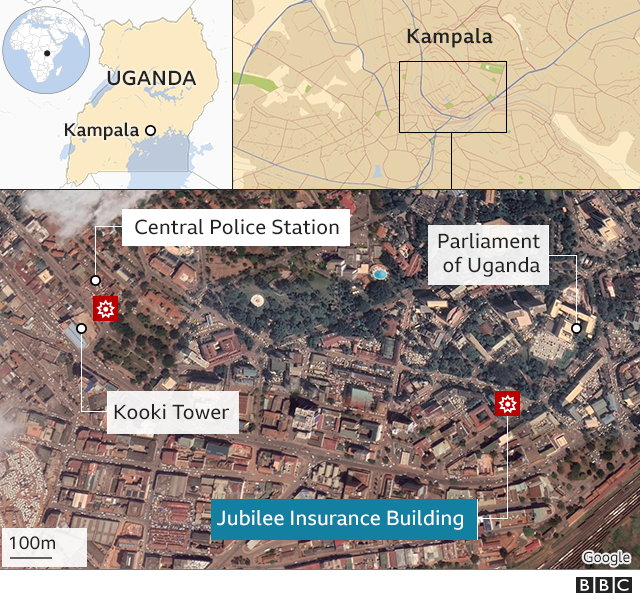Kampala blasts: Suicide bombers target Ugandan capital
Suicide bombers have targeted the Ugandan capital Kampala, killing at least three people and injuring more than 30 others, police say.
Three attackers on motorbikes blew themselves up near parliament and the city's police headquarters.
The number of dead is likely to rise, with the blasts leaving body parts strewn in the streets.
Officials blamed the attacks on the Allied Democratic Forces (ADF), an armed group based in the DR Congo.
"The bomb threats are still active, especially from suicide attackers," said police spokesman Fred Enanga.
A fourth attacker has been arrested and an explosive vest recovered, police said
Two policemen were among the dead. Thirty-three others were injured in the blasts, including five critically.
Proceedings in parliament were called off and MPs advised not to come to the building following the attacks.
Cars parked near parliament went up in flames, while the explosion near the police station shattered windows.
"A booming sound like that from a big gun went off. The ground shook, my ears nearly went deaf," Peter Olupot, a bank guard who was close to the attack near parliament, told Reuters news agency.

Police said the attacks were carried out by a "domestic terror group" linked to the ADF.
The group formed in the late 1990s in opposition to Uganda's long-serving President, Yoweri Museveni. In recent years, its attacks began to be claimed by the Islamic State group.
Last month, the ADF said it was behind an attack on a bar in Kampala which killed a 20-year-old waitress.
Ugandan forces are also part of an African Union peacekeeping force in Somalia fighting al-Shabab, an insurgent group allied to al-Qaeda.


A dangerous fusion of domestic militancy and global extremism is now threatening Uganda's security.
The ADF has been co-opted in recent years by IS - and this is the biggest attack it has been linked to in Uganda since they established relations.
The ADF is also known as the Central Africa Province of the Islamic State. An Islamist group in Mozambique uses the same name - and it is waging a brutal insurgency there.
The militants know their way around and can blend into the local population. IS provides them with tactical support, helps wage their propaganda campaign - and has given them a new mission.
Regional intelligence and security agencies will have to work more closely together to combat the threat, and the public will have to be more vigilant.
Lifestyle ShowBiz
Terms of Use | Disclaimer| Privacy Policy | kennethmedia Hub | Copyright © 2021 | All rights reserved
Hotline: +233(0)554166683




Comments
Post a Comment